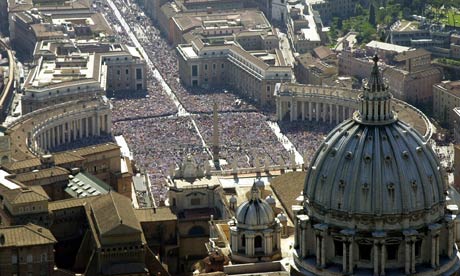I
watched news clips today of the celebration marking Chicago's Cardinal Francis George's 50th anniversary
as a priest.

During the mass, as he faced the congregation at Holy Name Cathedral, I
noted the array of cardinals that were seated behind him in semicircles. I understand
that they came from all over. I noted that they were all white. If there were
Latinos in the group, they were white Latinos. Not one dark face. Even though
there are African cardinals they were not on the altar behind Cardinal
George.
After
Mass, the celebration was continued at Chicago's exclusive Drake Hotel. The
finery was well displayed by the TV shots. This pomp and circumstance has not
been promoted by Pope Francis.
Cardinal
George has reached the mandatory retire age (75). I understand that his date of
retirement is near. One TV station commentator named three serious candidates. One of them is Archbishop Wilton Gregory of Atlanta.

Racism
and sexism remain stains on the souls of the white male-dominated Roman
Catholic hierarchy. African American bishops/archbishops continue to be locked
out of membership in the lofty “College of Cardinals” even though there are
many who should be members.
Archbishop
Wilton D. Gregory of Atlanta , Georgia is a
prime example of an African American who should be a member of that group of
“princes of the Roman Catholic Church.” Archbishop Gregory was converted to Roman
Catholic Catholicism while attending Chicago’s St. Carthage Grammar School. One
would think that his impeccable credentials are reasons for him to have been inducted
into the College of Cardinals many years ago.
He was
vice president and later president of the U.S. Catholic Bishop’s Conference and
under his leadership the Catholic bishops implemented the “Charter for the
Protection of Children and Young People.” He has authored several books and is
the recipient of numerous awards. The admiration he received from non-Catholics
is evidenced by the fact that he was inducted into the Martin Luther King Board
of Preachers at Morehouse College in Atlanta.
If, by
any chance, African Americans were nominated to be inducted as cardinals, it
behooves the Catholic hierarchy to make known such an effort. If no such nominations
were made, it behooves the Catholic hierarchy to explain why African Americans
are not in the College of Cardinals.
If Gregory is not elevated
to the position of cardinal, it will say a lot about the state of the Roman
Catholic Church. Since Archbishop Gregory distinguished himself as a Chicago
priest and a bishop in a diocese in Illinois, he is a natural for the
position.




